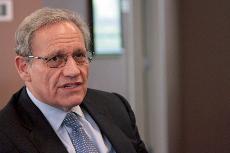Watergate legend, journalist and author Bob Woodward spoke at War Memorial Auditorium on 13 as the final event of Guilford College’s 2007-08 Bryan Series. Woodward also held a student session in the Community Center from 1 to 2 p.m. that day, which was attended by about 20 members of the community, many of which were Political Science and English majors.
“The way he talked to the students, he came across as really wanting to connect with them,” said Brian Ewing, staff writer for the Greensboro News and Record. “Anything to get more young people involved in journalism is great.”
“It was a really amazing experience to be able to hear from him. In the session he treated us as contemporaries and didn’t dumb it down,” said junior Padraic Lehane, a staff writer for the Guilfordian. “I thought he was pretty straightforward about a lot of stuff and as honest as he could be, even though I didn’t necessarily always agree with him.”
Most recently, Woodward has authored three books on the Bush Administration’s handling of the war in Iraq: Bush at War, Plan of Attack, and State of Denial. His fourth book in the series, Bush at Wart Part IV, will be coming out in Sept. 2008.
Woodward discussed his previous experiences, namely Watergate, and issues such as the current state of the news industry and its link to politics, the Iraq war, his 7-hour interview with George W. Bush, the current elections, and the role of journalists in a democracy.
“I don’t think I was aggressive enough in the lead up to the war and I fault myself mightily for that,” said Woodward. “My disappointments are greater because this war is really going to determine America’s place in the world.”
“I was really impressed with how he was apologetic for not putting a lot of effort in the pre-war reporting,” said sophomore Amanda Pressley, an English major and Guilfordian staff reporter. “I really wasn’t expecting him to say ‘I failed the American people.'”
Woodward said that he had three major sources who personally believed that there were weapons of mass destruction in Iraq but that “there’s no smoking-gun intelligence.”
“He took pains to admit his fault in not questioning those who believed there were weapons of mass destruction in Iraq in 2003, which I appreciated,” said senior Political Science major Malcolm Kenton. “Though I wish he would have done his journalistic duty then.”
“I failed to look into the meaning of the words ‘there is no smoking-gun intelligence,'” said Woodward. “I had no basis on which to challenge the claim that there are weapons of mass destruction in Iraq, but my sources had a basis for me to doubt and investigate.”
“It’s great that he said he wasn’t aggressive enough, but he didn’t acknowledge how the whole thing was a catastrophe. It was a total failure of American journalism to not question the very shotty evidence,” said Lehane.
Assistant Professor of Political Science Kyle Dell said that he most appreciated Woodward emphasizing that openness is necessary for democracy,and the fourth estate’s role in such a system.
“I think that we have better relations between the rulers and ruled if we have this openness,” said Dell,.”Although I think we should also accord our elected officials with a distance and freedom to make difficult decisions at times, I thought this was the most enlightening part of his speech.”
However, Woodward did no go into how this “openness” can be achieved.
I think that his perspective was a healthy one on democracy,” said Dell “But I don’t think he communicated how difficult this was to achieve though. Having had the experiences he’s had in Washington, I’m sure he realizes this, but it was something that he didn’t dwell on in his speech.”
Kenton said that he appreciates his focus on openness, especially when thinking about the current presidential race.
“His call for greater transparency was key,” said Kenton. “The most important things to know about a presidential candidate are what they feel that have a duty to do, and what they have a zeal for, beyond upholding, protecting and defending the Constitution and enforcing the laws.”
Dell asked Woodward if he felt that cynicism was warranted in the American people’s view of politicians.
“I don’t think cynicism is a good word,” said Woodward “I would be skeptical, but I wouldn’t write them off. They all have good intentions. No one wants to become president to screw things up.”
Kenton and Dell said they appreciated Woodward’s emphasis on healthy skepticism.
“Although he didn’t reveal how we could strike this delicate balance of skepticism, I appreciated his perspective and attitude about this important topic,” said Dell.
When asked about the current state of the newspaper industry Woodward said that “the newspapers are running low on money, but the fourth estate will always exist in some form because one of the premises of constitutional political doctrine is that concentrations of power are not safe.”
Woodward said that in a democracy the fourth estate, specifically watchdog reporting or as Woodward prefers to call it “in-depth reporting” is necessary to keep the powers in check, and to keep them balanced.
“I think that it is really comforting that Woodward still has faith in the fourth estate and that he still sees it happening,” said Pressley. “It’s really important coming from him because he was one of the people who did watchdog reporting and was really groundbreaking in that field.

